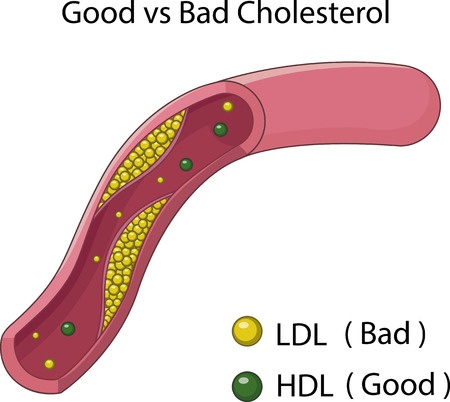Facts about Good and Bad Cholesterol

Many people have heard about good and bad cholesterol but do not realize that both good and bad cholesterol act in different ways. The thing about cholesterol is that it is unable to dissolve in your blood so it travels through your bloodstream. When someone has very high bad cholesterol levels, it can start to block arteries and cause many health problems. Of course, a healthy diet and exercise can help minimize effects, but it is also good to know about the different good and bad cholesterol themselves.
LDL Cholesterol = Bad Cholesterol
LDL cholesterol is what any medical professional will tell you is considered the ‘bad’ cholesterol that you have to watch out for. This is what primarily contributes to build up and plaque within the arteries, which in turn makes them less flexible. Clots can begin to form putting a lot of undue stress upon your arteries making it increasingly more difficult for your blood to flow through your body, as it should.
HDL Cholesterol = Good Cholesterol
HDL cholesterol actually helps to remove bad cholesterol from the bloodstream. Think about how a scavenger moves and acts, HDL is comparable in the way that it virtually attacks LDL cholesterol and clears the path for free flowing blood. Close to 1/3 of bad cholesterol is carried throughout the body by HDL cholesterol which when balanced properly can help prevent heart disease and strokes.
Triglycerides
This is a term that you may hear about when visiting with your hearth physician and is a type of fat within your body. It is used primarily to store excess fat, like how bears store fat to hibernate during winter months. Unfortunately, when triglyceride levels are very high – it can throw your whole body off balance therefore causing health problems as well.
It is imperative to ask your doctor about good and bad cholesterol levels and what measures you can take to ensure you remain in optimal health.
Giovanni B. Ciuffo, MD – Director, Minimally Invasive and Bloodless Heart Surgery Program
Dr. Ciuffo’s expertise in Minimally Invasive Heart Surgery and Bloodless Heart Surgery is the result of a career dedicated to the development and improvement of these techniques. He currently runs a busy Cardiothoracic Surgery practice and directs a dedicated Minimally Invasive and Bloodless Heart Surgery Program at Mercy Medical Center in Canton, OH.

